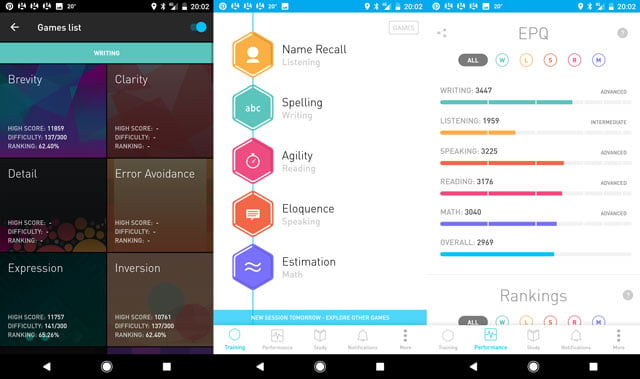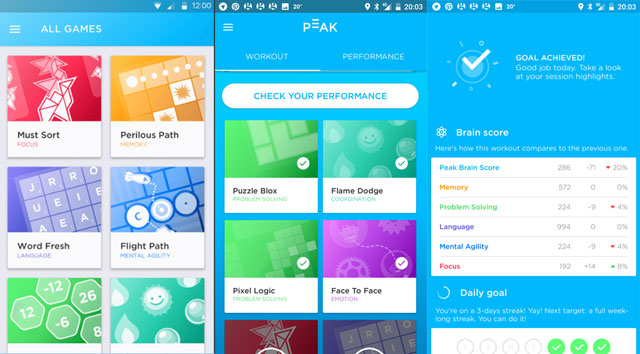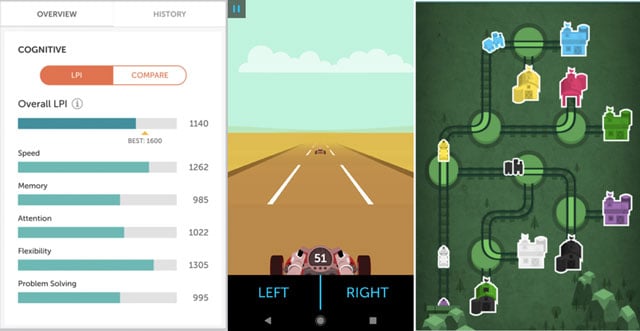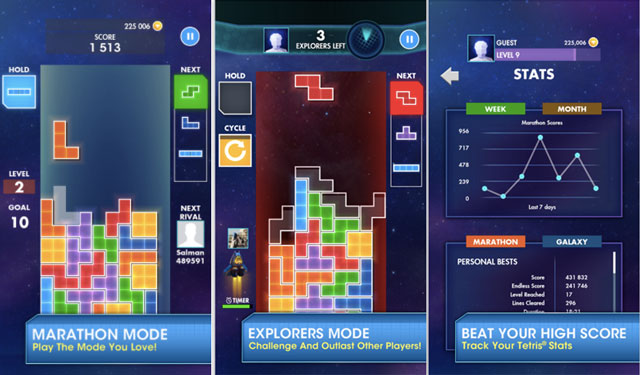We may earn commissions when you buy from links on our site. Why you can trust us.
Brain Training Apps that Really Work
There’s certainly no shortage of apps that claim to boost your brainpower by having you pop numbered balloons in ascending order or drop blocks into obligingly shaped gaps. But does practicing such games translate into aptitude at real-world tasks?
That question has long been debated (often between scientists and the developers of the games). A recent, large-scale study found that, in healthy young adults, brain-training games do not improve cognitive ability except in areas involving in playing the game. However, other studies have found improved reasoning and problem-solving skills in over-50 adults who played brain-training games.
There’s also some evidence that a specific type of brain-training exercise called the dual N-back, which involves increasingly gruelling rounds of shape-matching, improves overall cognition: specifically, fluid intelligence (the brain’s overall capacity for learning new things and problem-solving) and working memory (the ability to juggle information, used in tasks ranging from recipe-following to navigating). In dual N-back, players watch a row of incoming shapes. In round one, they tap a shape if it is the same as the one previous; by round three, they must tap a shape if it’s the same as the shape three previous. Some brain-training apps include versions of the dual n-back.
Certain real-world tasks do benefit from simple practice – arithmetic (for bill calculation, say) or improving spoken vocabulary. And some brain-training apps are now incorporating such exercises. The challenge of playing a new game could also help sharpen mental acuity – learning and other mental stimulation has been shown to stave off cognitive decline.
In choosing our favorite brain-training apps, we looked at the variety and challenge of games included, the applicability to everyday life, as well any research into the brain benefits (coupled with the necessary pinch of salt).
Elevate
Still one of our favorites, Elevate incorporates a huge range of games underpinned by real-world applications, in five streams that hark back to schooldays learning: Listening, Writing, Reading, Speaking, and Math. Each of these spans intriguingly named skills such as Brevity or Eloquence. In one exercise, you’re asked to type in the best synonyms, rather than choosing from a list, which can be helpful for those struggling with that word on the tip of the tongue.
Highly practical exercises include sum estimation (handy for those bill calculations), tests of common spelling and grammar errors, and, uniquely, audio passages whose details you’re quizzed on (I have quite abysmal listening skills, it turns out).
Exercises become harder the more you play, with the option to unlock “Study Materials” for skills such as public speaking after finishing five daily training sessions. Pro users get unlimited access to games, unlimited plays and more analysis on their performance.
The research: Elevate users tested 69% better than nonusers on questions in grammar, writing, listening, and math (devised by an independent research company), the key practical skills designed to be trained by the app.
The pinch of salt: Performing well in a test doesn’t necessarily translate to performing at work or in social situations
Price for full access: 1 month for $11.99, 1 year for $44.99, lifetime membership for $149.99
Get Elevate for iPhone or Android
Peak
Instead of academic areas, Peak focuses on specific cognitive skills such as memory, mental agility, problem-solving, focus and language (that is, ability to communicate). Games tend to be more visual than Elevate, including a Sudoku-esque visual puzzle and number popping in numerical order.
Some exercises also rather dubiously deal with “emotional training” – for example, spot the smiling faces and match them up, while ignoring the frowning faces, in order to challenge one’s ability to focus on the positive. (That said, I ranked worse than 97% of the population at this.)
One of the highlights of Peak is the visual display of your performance as a constellation of all cognitive skills so you can instantly see your top skills. Along with full access to games and insights, Pro-users can additionally compare their particular constellation to others in other age groups and professions.
The research: The premium-only Advanced Training Program is a memory game called Wizard, created in conjunction with scientists or institutions including Cambridge University, based on research that demonstrated its benefits for visual and episodic learning, and new learning.
The pinch of salt: The original research focused on patients with schizophrenia
Price for full access: 1 month for $4.99, 1 year for $34.99
Get Peak for iPhone or Android
Lumosity
Lumosity has backed away from its claim that playing Lumosity sharpens mental acuity in everyday life, but its team of neuroscientists, psychologists and game developers are still turning out quick, beautifully designed exercises. These are intended to work cognitive skills such as information processing, spatial orientation and working memory, in surprisingly fun mini-games such as reorganizing a train track on the fly to get carriages home to the right station. The app also recently added a Mindfulness category comprising led meditation sessions for focusing breath and attention, ranging from one minute to several minutes long.
As with its fellow brain-training apps, the paid-for version unlocks the vast majority of games as well as access to analysis on your cognitive skills.
The research: A study of 4,700 participants found that the half who played Lumosity performed better at a general cognition test than the half who did crossword puzzles.
The pinch of salt: The link between test performance and everyday smarts is still to be defined.
Price for full access: 1 month for $11.99, 1 year for $59.99
Get Lumosity for iPhone or Android or play it on the web
Tetris
Long before brain-training became a billion-dollar app market, this addictive classic was worming its way into our minds and Gameboys. One study found that over 60% of participants dreamt about the falling Tetris blocks, suggesting the brain was working in sleep to make sense of the game.
The gameplay of rotating various shaped blocks to fit into your existing rows is an elegant test of spatial intelligence – the ability to visualize the orientation of objects in space. The current version for iOS and Android adds a couple of new modes, including for competing against other players, plus a personal bests tracker to relive past glories.
The research: Adolescent girls who played Tetris were found to have a thickened cerebral cortex, with brain efficiency possibly increased. Recent studies also found that playing Tetris can reduce addictive cravings and block painful memories in PTSD sufferers.
The pinch of salt: The studies didn’t investigate whether brain changes applied to other cognitive skills like working memory or spatial reasoning
Price: Free, $4.99 for ad-free
Get Tetris for Phone or Android
The bottom line…
The jury is still out on the real-world benefits of brain-training – though interestingly, brain-training appears to raise IQ points for those who believe it does.
However you choose to exercise your gray matter – with language-learning, crossword solving, or a brain-training app - make sure you keep challenging yourself with tougher puzzles. Any benefit of a brain exercise come only while the exercise is still difficult.
[Man thinking with smartphone via Shutterstock]
Updated on 7/31/2017 with new app information
Discussion 
The Brain Workshop page says it will work on XP and Vista. Says nothing about Win7. Has anyone tried Brain Workshop on win7? I do not have the money for Luminosity or FitBrain but I sure don’t want to mess up my computer downloading it if BrainWorkshop doesn’t work right using win7. Thanks for any help!
Sorry for the slow response. It does work on Win7 and Win8. I just installed the program and tried it.
So the expert says these games are pretty much useless yet the article goes on to advertise them with their top pick of course being the most expensive. I have to agree with the expert, these games are useless. If you really want to exercise your brain, put that stupid game down, get off of the couch, and go live life.
Dr. Fotuhi doesn’t say brain training games are useless. Number two on his list of things you can do to improve your brain’s health is memory exercises, which the best brain training games can provide.
My favorite brain game is Brainwell. It is the most interesting, cheapest, and best made app out there. You guys should check it out.
Yeah, it’s really simple and is free of cost, it’s in app purchase aren’t also expensive like others. The look, the feel, everything is great.
The research shows that these brain training exercises only improve the narrow task exercised. So, if you want to find the duck faster, keep doing that exercise. If you need to get better at mental math, do mental math exercises or Sudoku.
These exercised DO NOT change the progression of Alzheimer’s or such.
Read, get outside, engage in life, do things you enjoy, be with nice people, eat healthy, get good sleep. These will all do more for your brain than any brain training exercise.




















From Sharon on March 05, 2014 :: 1:20 pm
I LOVE Luminosity! I had dappled with their free account for about 6 months last year which gave me limited access. Had an “ah hah” moment when I realized that there is a family history of mental illness on my father side & dementia on my mother side. At 56, I stopped dappling, & made it part of my daily routine. I have seen a difference in memory, focus & concentration. Last month I took advantage of a 30% off special & took out a family membership. Now my son ( recently diagnosed with schizophrenia), my grown daughter (new college student @ 30 something)& 2 oldest grandchild ( ages 15 & 11) all play brain games.
Reply